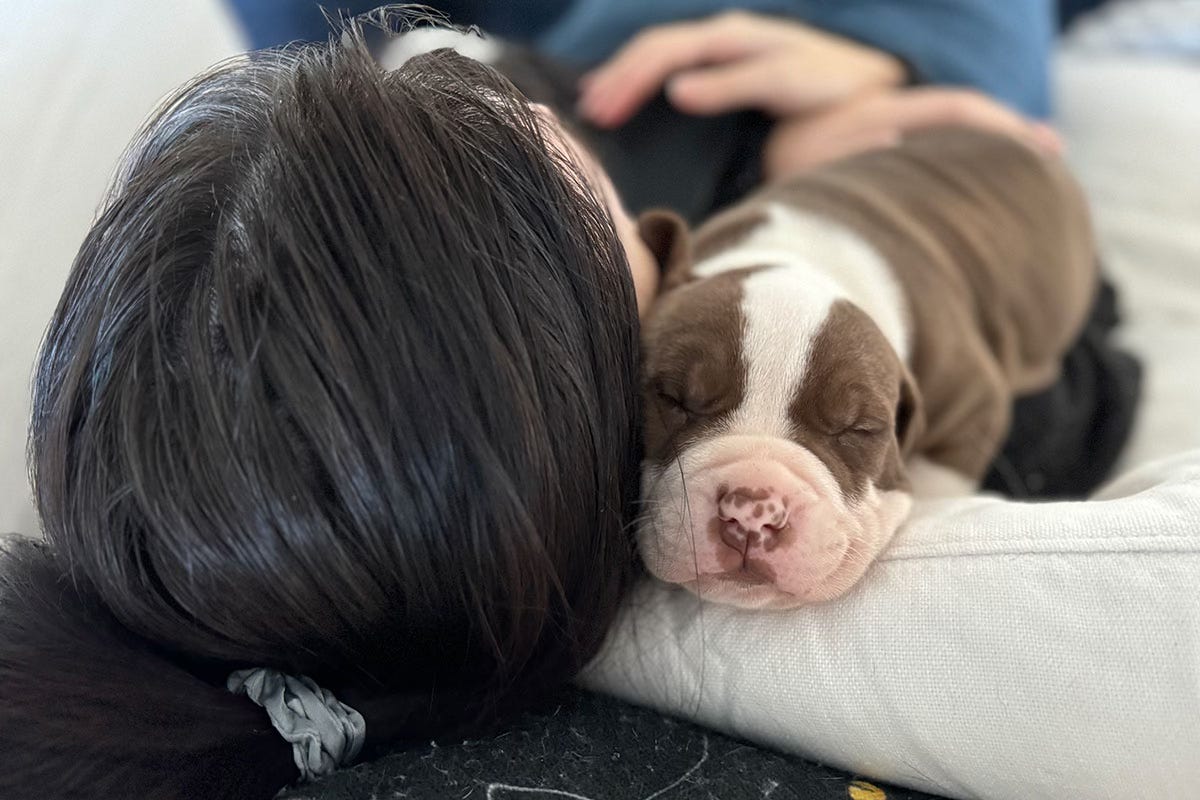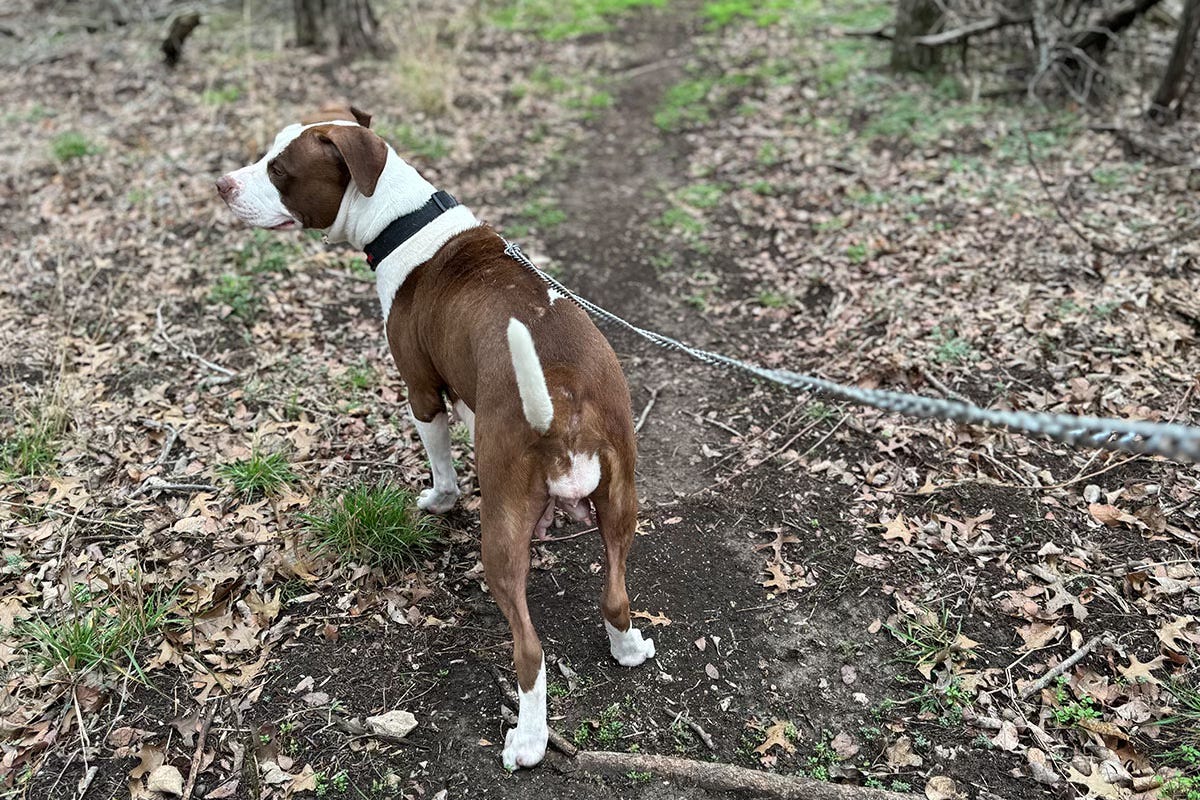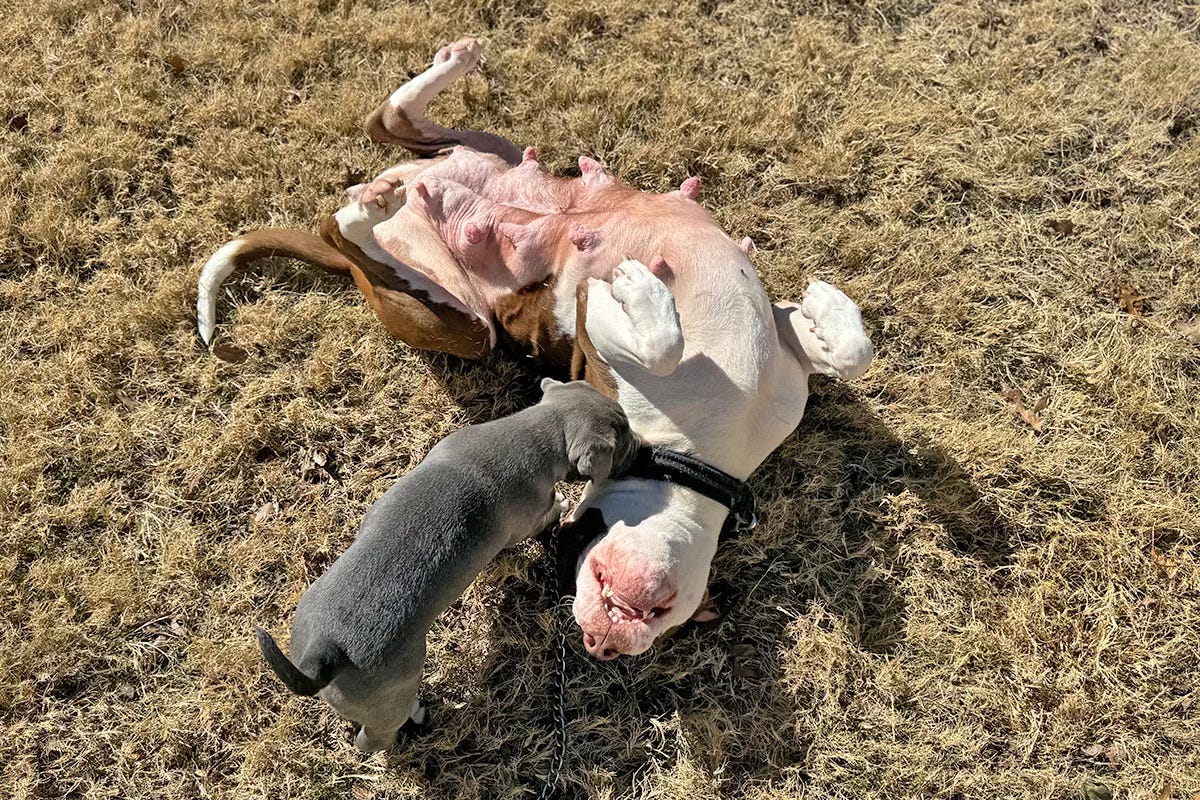What if 'getting our bodies back' wasn’t the goal?
How fostering a mama dog and her newborn pups changed the way I think about body trust. Plus, cute pup pics!
Motherhood takes an enormous amount of energy—something I’ve been reminded of over the past four weeks while fostering a mama dog and her three puppies.
This has long been on my bucket list, and the pups’ arrival couldn’t have come at a better time. With the devastation of the LA wildfires and the unsettling changes of this new presidency, the start of this year feels especially heavy. These pups have been a bright spot, bringing joy and light to a time that feels cold and dark.
And honestly, they’re almost too cute for words—snuggling and kissing them, and watching them grow into playful, tail-wagging pups has been pure joy.
But they arrived just as I was finally sleeping well again (thanks to starting hormones for my perimenopause symptoms). Suddenly, I was back in the exhausting days of new motherhood. Time slowed to a crawl. My days blurred into three-hour increments, dictated by round-the-clock care for mama and her pups.
The first day felt like a week. The first week felt like a month. I was secretly panicking—how would I possibly make it five more weeks until these babies could be adopted? I was so damn tired—waking up twice a night to let Mama Wiggles out, pouring every ounce of energy into keeping the puppies safe, clean, and cared for.
It was nearly as demanding as the days caring for my own newborns—only now I have the wisdom that comes from time and experience.
This experience has reaffirmed so much about my own experience as a new mother—how deeply I cared for my own babies, the immense pressure I put on myself to breastfeed (a struggle with all three of my children), and the unfortunate push I felt to "get my body back."
But it also made one thing clear: Even with the cuteness, I’m happy to be past this stage of life.
I’ve read time and again that perimenopause marks a shift from caregiving to new areas of exploration. Some say the declining estrogen levels in peri help ease the biological pull to nurture, creating space for women to prioritize themselves and their desires in ways they never have before.
Neuropsychiatrist Louann Brizendine calls this time “The Upgrade”—a phase where, free from hormonal fluctuations, we women finally gain the clarity to see who we are, what we want, and how we want to live. She argues that midlife hormonal changes empower us to live with greater authenticity.
To be clear, no one truly knows why we go through menopause. What I do know is that I’m not the same person I was five years ago—and certainly not the same as I was 23 years ago when I became a new mom. My priorities and values have shifted in ways I never could have imagined.
And yet, as I cared for this mama dog in those early days, I couldn’t help but notice the parallels to human motherhood—and the stark differences.
She wasn’t burdened by expectations or external pressures—no meddling relatives, well-meaning doctors, online influencers preaching their methods (and peddling their products), or strangers offering unsolicited advice. All she had to do was take care of herself and her pups.
In those early days with her, when the pups were just a couple of weeks old, one of my jobs was giving her relief from the babies and letting her out to do her business. I had read that new mama dogs should free-feed—basically, she should be allowed to eat and drink as much as she wants so she has enough energy to breastfeed.
Can you imagine if women had the same freedom? If we breastfed without pressure to “bounce back,” simply eating as much as we needed—following instinct? Mamas, puppies, babies—we are all born knowing exactly how much we need and when we’ve had enough.
But somewhere along the way, we lose this instinct—drowned out by advice, both good and bad. We’re told when to eat, what to eat, how much is “too much.” We learn to appease the external, ignore the internal, actual needs be damned.
Mama had none of this pressure, but because she was eating and drinking nonstop—easily 10 times what my mutt Sterling (who’s 20 pounds heavier) eats in a day—I had to let her out constantly. It was shocking how much she ate in the beginning—she was insatiable! I can’t imagine any new mom I know allowing herself that same freedom.
Given how much she was consuming, I had to take her out frequently, so we’d go for short walks around the neighborhood so she could do her business. The first few days, she could only go the length of a few houses before she’d need to turn around.
It was on one of those first walks that it occurred to me: mama wasn’t the least bit worried about getting her pre-baby body back. She wasn’t trying to set a new PR each time she went out. She didn’t need to prove herself.
With time and healing, her body—and eating habits—adjusted naturally. Now that the puppies are six weeks old, she loves romping along the trail behind my house and can go a couple of miles before tiring out. As the pups wean and sleep through the night, she’s also eating less and sleeping longer, taking care of herself.
Watching her body adjust so effortlessly made me realize: these changes are natural—but we’re taught to fight them.
And we learn this early.
Postpartum isn’t the only time women experience massive body changes. From puberty to menopause, our bodies are constantly shifting. Yet, instead of trusting those changes, we’re conditioned to resist them.
Puberty hits girls earlier than boys, typically around ages 11–12, and brings dramatic physical changes. Before puberty, girls gain about five pounds per year, but during puberty, that number jumps to 12 to 23 pounds annually, according to registered dietitian Maryanne Jacobsen.
Fat accumulation at this stage isn’t just normal; it’s necessary to support menstruation and development. Yet, this is also when many go on their first diets, often encouraged by parents who simply don’t realize what’s normal.
Making it more complicated is that growth and development don’t follow a one-size-fits-all timeline. Even at birth, our “normals” are different. I saw this firsthand with the pups—Mini Me, the largest of the litter, has consistently stayed 1–2 pounds ahead of his brother and sister, who have smaller frames and look completely different from him.
Birth, puberty, and pregnancy aren’t the only times our bodies undergo dramatic, uncontrollable changes. Decades later, perimenopause brings another seismic shift—one that is often met with resistance, confusion, and attempts to control what’s natural.
I’m part of a Facebook group for female athletes and active women transitioning to menopause. Despite a clear rule that the group is not about weight loss, ninety percent of the conversation still revolves around just that. Even with all the challenges of this transition—brain fog, night sweats, hot flashes, and joint pain—for so many of us, the number on the scale feels like the only thing that matters.
"I’m doing everything I always did, and the scale keeps creeping up.”
"I’m eating less, working out more, and nothing is changing.”
I get the frustration. I do. But at some point, we have to ask ourselves—what if the problem isn’t us? What if our bodies aren’t failing us, but just doing what they’re meant to do?
At every life stage—puberty, pregnancy, menopause—the message we get is that our bodies should be controlled rather than trusted.
I carried that pressure through puberty, pregnancy, postpartum, up until perimenopause. I could fill a book with the trauma I experienced during pregnancy because of how much weight I gained!
But stepping away from dieting and recognizing the grip of diet culture has opened my eyes to just how much of my existence has been shaped by it.
And while I still feel the pressure—it’s impossible not to, surrounded by diet culture—I have something now that I didn’t have as a teenager or a new mother: awareness.
Thankfully, mama dog isn’t worried about any of this. No guilt. No second-guessing. Just instinct.
Now it’s your turn. How have major life transitions shaped the way you see your body? Which stage was the hardest? And what’s something you’ve learned in midlife that you wish you’d known sooner?












We have so much to learn from animals.
As a dog breeder myself, I resonated with every word. I’ve learned many of life’s most important lessons from dogs 🤍